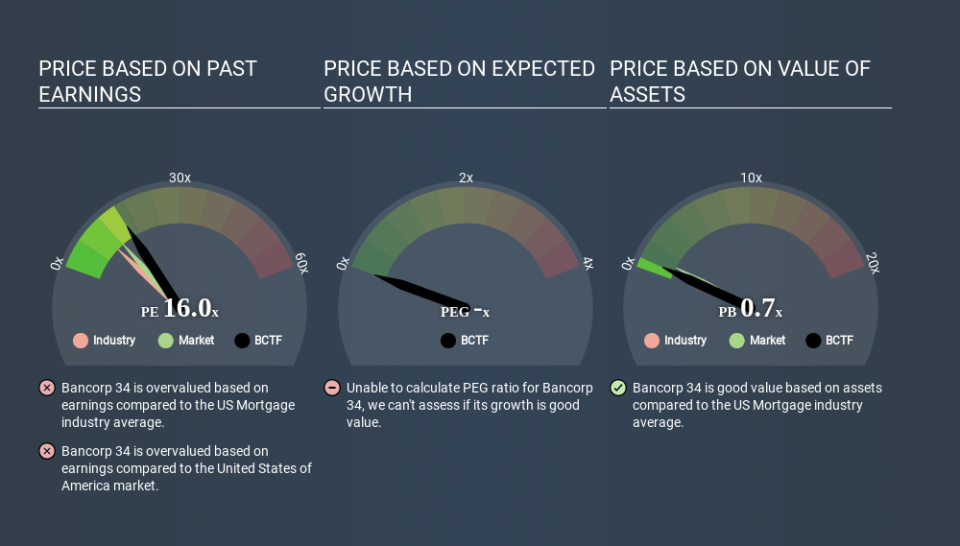How Does Bancorp 34's (NASDAQ:BCTF) P/E Compare To Its Industry, After The Share Price Drop?

Unfortunately for some shareholders, the Bancorp 34 (NASDAQ:BCTF) share price has dived 33% in the last thirty days. Indeed the recent decline has arguably caused some bitterness for shareholders who have held through the 34% drop over twelve months.
All else being equal, a share price drop should make a stock more attractive to potential investors. In the long term, share prices tend to follow earnings per share, but in the short term prices bounce around in response to short term factors (which are not always obvious). The implication here is that long term investors have an opportunity when expectations of a company are too low. Perhaps the simplest way to get a read on investors' expectations of a business is to look at its Price to Earnings Ratio (PE Ratio). A high P/E ratio means that investors have a high expectation about future growth, while a low P/E ratio means they have low expectations about future growth.
See our latest analysis for Bancorp 34
How Does Bancorp 34's P/E Ratio Compare To Its Peers?
Bancorp 34's P/E of 15.99 indicates some degree of optimism towards the stock. The image below shows that Bancorp 34 has a higher P/E than the average (10.2) P/E for companies in the mortgage industry.
That means that the market expects Bancorp 34 will outperform other companies in its industry. The market is optimistic about the future, but that doesn't guarantee future growth. So investors should always consider the P/E ratio alongside other factors, such as whether company directors have been buying shares.
How Growth Rates Impact P/E Ratios
When earnings fall, the 'E' decreases, over time. Therefore, even if you pay a low multiple of earnings now, that multiple will become higher in the future. A higher P/E should indicate the stock is expensive relative to others -- and that may encourage shareholders to sell.
Bancorp 34 increased earnings per share by 8.3% last year. And earnings per share have improved by 23% annually, over the last five years. In contrast, EPS has decreased by 26%, annually, over 3 years.
Don't Forget: The P/E Does Not Account For Debt or Bank Deposits
It's important to note that the P/E ratio considers the market capitalization, not the enterprise value. That means it doesn't take debt or cash into account. Hypothetically, a company could reduce its future P/E ratio by spending its cash (or taking on debt) to achieve higher earnings.
Such expenditure might be good or bad, in the long term, but the point here is that the balance sheet is not reflected by this ratio.
How Does Bancorp 34's Debt Impact Its P/E Ratio?
Net debt is 40% of Bancorp 34's market cap. While it's worth keeping this in mind, it isn't a worry.
The Bottom Line On Bancorp 34's P/E Ratio
Bancorp 34 has a P/E of 16.0. That's higher than the average in its market, which is 12.2. With modest debt relative to its size, and modest earnings growth, the market is likely expecting sustained long-term growth, if not a near-term improvement. What can be absolutely certain is that the market has become significantly less optimistic about Bancorp 34 over the last month, with the P/E ratio falling from 23.7 back then to 16.0 today. For those who prefer to invest with the flow of momentum, that might be a bad sign, but for a contrarian, it may signal opportunity.
When the market is wrong about a stock, it gives savvy investors an opportunity. People often underestimate remarkable growth -- so investors can make money when fast growth is not fully appreciated. We don't have analyst forecasts, but you could get a better understanding of its growth by checking out this more detailed historical graph of earnings, revenue and cash flow.
Of course, you might find a fantastic investment by looking at a few good candidates. So take a peek at this free list of companies with modest (or no) debt, trading on a P/E below 20.
If you spot an error that warrants correction, please contact the editor at editorial-team@simplywallst.com. This article by Simply Wall St is general in nature. It does not constitute a recommendation to buy or sell any stock, and does not take account of your objectives, or your financial situation. Simply Wall St has no position in the stocks mentioned.
We aim to bring you long-term focused research analysis driven by fundamental data. Note that our analysis may not factor in the latest price-sensitive company announcements or qualitative material. Thank you for reading.

